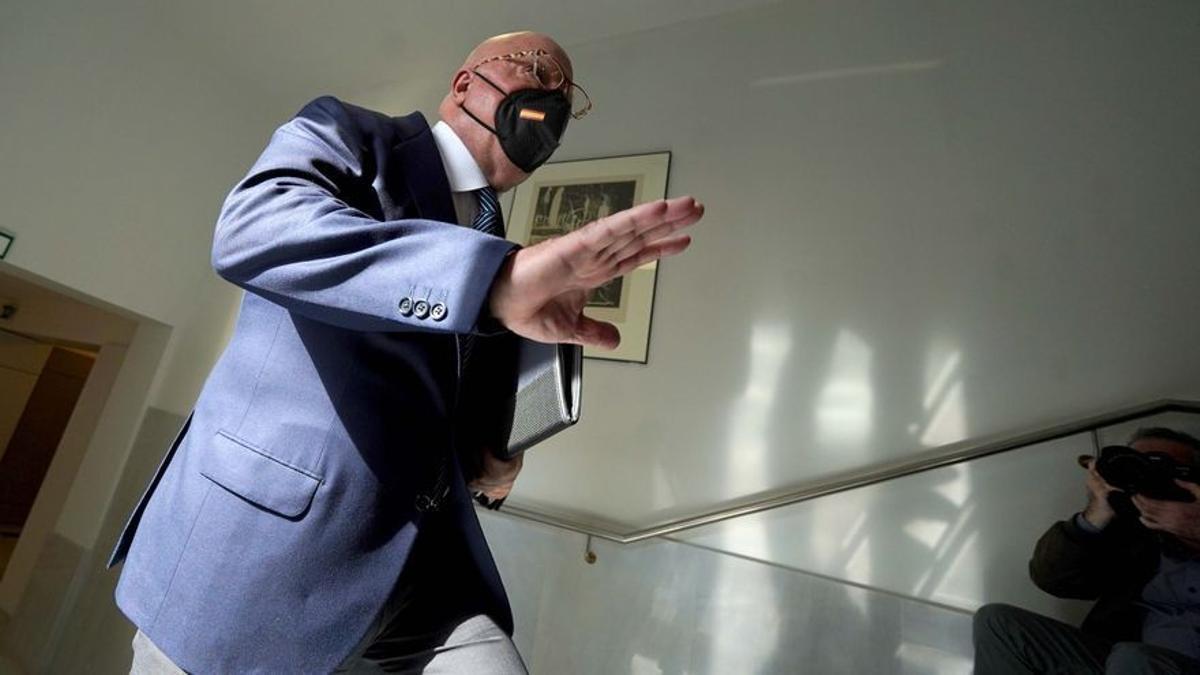The Provincial Court of Madrid sentences him to three years and nine months in prison and to pay six million euros | He used shell companies to receive the “hidden money he had abroad”
Enrique Maestre Cavanna, the lawyer who received 12.6 million euros along with José Manuel Villarejo in the biggest ‘hit’ that the retired commissioner is known for, has been sentenced to 3 years and 9 months in prison and pay 6 million euros for two offenses against the Public Treasury and one for money laundering. This has been decreed by the Provincial Court of Madrid in a sentence to which it has had access The Newspaper of Spainfrom the Prensa Ibérica group, and which details the ‘modus operandi’ with which the lawyer sent the money he had hidden abroad.
In that sentence, Joaquín de Arespacochaga has also been sentenced as a necessary collaborator, son of the former Francoist mayor of Madrid Juan de Arespacochaga, for whom the Provincial Court of Madrid has decreed 1 year and four months in prison and 3.7 million euros between a fine and compensation. In addition, and jointly, both Arespacochaga and Maestre Cavanna must compensate the Public Treasury with almost 2.7 million euros plus interest.
As the court has proven, the lawyer, who was a partner of Villarejo in the so-called Pit operation, “omitted” the obligation to present the income statements for the years 2007 and 2008 despite the fact that he received “amounts that he kept hidden from the Public Treasury.” For this, he explains the judicial documentation, he placed that money under the ownership of three companies “without real activity and used as mere screens at the service of fraud and whose funds he was the real owner.”
Hidden funds abroad
He origin of money that fed these companies “front” of the lawyer could not always be traced to the last term, since it came from other companies based in countries of “zero collaboration in the exchange of tax information” such as Luxembourg or Switzerland.
In 2007, for example, Maestre declared that he had entered only 13,612 euros subject to taxes, but the Court considers that he had an unjustified capital gain of more than 1.8 million euros, for which reason did not pay 795,430 euros to the Public Treasury for personal income tax In 2008, on the other hand, the figures increased considerably, since it began to have an income base of 4.4 million euros and stopped paying almost 1.9 million euros to the Treasury.
That year, explains the judicial documentation to which El Periódico de España has had access, Maestre Cavanna also had at his disposal more than 2.1 million euros that were paid into two checking accounts abroad, one of them at Banco Crédit Agricole and another at the Union of Swiss Banks (UBS). However, they were not in his name, but in that of another of his shell companies, Reichmann, SA
To help him create the entire “international corporate structure necessary both to defraud the Treasury and to return the defrauded capital under an appearance of legality”, Maestre contacted Arespacochaga, who channeled the advice through Acquire Spain, a company of which he was administrator. He, says Justice, was also in charge of monitor and manage accounts currents of the different companies.
Front companies
One of the “front” companies used to invoice these advisory services was Kudureiad SL, which, for example, also served to pay Maestre under the appearance of social spending 12,245 euros intended to pay for their family vacations, as well as another 50,300 euros paid in cash to Trazado Viajes SA that the Justice has not been able to identify where they came from. In addition, explains the Provincial Court of Madrid, Maestre paid a company almost 100,000 euros in cash, about 6,000 euros per month, for the rent of the family home, but the origin of the money has not been verified either.
In Kudureiad, for example, the money would have come from a Luxembourg company called Naafco International, SA, which, in just nine months of 2007, made transfers in favor of Maestre’s Spanish company worth 244,000 euros. According to the Justice, the person who was behind Naafco was, once again, Maestre Cavanna himself, and his “sole purpose was to send him the funds that he had hidden abroad“.
Villarejo’s partner is also the son of the late businessman Tomás Maestre Aznar, promoter of the construction in La Manga del Mar Menor, Murcia, whose recumbent inheritance maintains, according to the official list of defaulters of the Treasury for 2022, a debt of almost 2 .2 million euros with the Tax Agency.
12.6 million with Villarejo
On the other hand, a report from the Tax Agency included in the separate part called ‘Pit’ of the Villarejo case on the failed extradition of the shipping company Ángel Pérez-Maura to Guatemala, it specifies that Maestre Cavanna collected 5,131,797 euros from this businessman in exchange for preventing his delivery to the Central American country. The Guatemalan government claimed him in relation to the alleged payment of 30 million in bribes for the then president of the Central American country Otto Pérez Molina and his number two Roxana Baldetti.
For this same operation, Villarejo entered with the companies Cenyt SL and Stuart & Mckenzie Spain a total of 7,498,646 euros from the Pérez-Maura, always according to the latest report sent by the Tax Agency to the National Court.
For his part, Joaquín de Arespacochaga It also appears in the summary of the tandem case about Villarejo’s activities, since he would have tried to do business with the commissioner in Saudi Arabia, but also with José María Clemente Marcet, an alleged collaborator of the FBI and the National Police, who was a partner of the former police command in the Dominican Republic.
